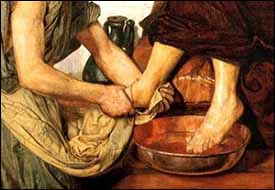
|
Old Testament
New Testament
Gospels
Acts
Paul's Letters
General Letters
Revelation
Topical Studies
Beginning the Journey (for new Christians). en Español

|
Old Testament
New Testament
Gospels
Acts
Paul's Letters
General Letters
Revelation
Topical Studies

|
Home
Bible Studies
Articles
Books
Podcasts
Search
Menu
Donate
About Us
Contact Us
FAQ
Sitemap
 Ford Madox Brown, detail of 'Jesus Washing Peter's Feet' (1852-56), Tate Gallery, London. Full image. |
Humble service is a core disciple behavior. Jesus says so -- again and again.
When the disciples quarrel about who is greatest, Jesus says:
"Whoever wants to become great among you must be your servant, and whoever wants to be first must be slave of all." (Mark 10:43-44)
At the Last Supper, amidst murmurings of who is the greatest (Luke 22:24), Jesus removes his outer garment and -- dressed now like a slave with a towel tied around his waist -- goes from one disciple to another, washing dirty, calloused feet (John 13:1-17).
The disciples are utterly shocked! In the culture of Jesus' day, common people washed their own feet with a basin and towel provided by the host. Washing someone else's feet was considered so low, so menial, that Hebrew slaves couldn't be required to do this -- foreign slaves, perhaps, but not Hebrew slaves. A devoted disciple might wash a rabbi's feet. A wife might wash a husband's feet, perhaps, or a child his father's. But the Master, the Leader, washing his own underlings' feet? It was unheard of!
His disciples shift in their seats, extremely uncomfortable at what Jesus is doing. It is humiliating for these men. Peter is incensed. "You'll never wash my feet!" Jesus rebukes him sharply. When he is finished, Jesus puts his clothes back on, takes his place at the table, and begins to explain.
"You call me 'Teacher' and 'Lord,' and rightly so, for that is what I am. Now that I, your Lord and Teacher, have washed your feet, you also should wash one another's feet." (John 13:13-14)
Luke records another word from the upper room.
"Who is greater, the one who is at the table or the one who serves? Is it not the one who is at the table? But I am among you as one who serves." (Luke 22:27)
In Jesus' Kingdom, the greatest serves the least, the king serves the slave. In Jesus' Kingdom, we don't flaunt position. We don't act as if we are too good to perform some menial task. We count serving the least among us as an honor. This is Jesus' radical message.
What are the implications of all this? As I pondered humility, God surfaced this question in my heart: How humble am I when my wife asks me to do something? Am I quick to serve or resentful that my precious time is being interrupted? Am I really humble before my wife?
Immature husbands might justify themselves by hoisting the flag of headship (Ephesians 5:23). Yet, a sentence or two later, Paul combines home and husbands with Christ and his Church.
"Husbands, love your wives, as Christ loved the church and gave himself up for her...." (Ephesians 5:25a).
He gave himself up. In Jesus' Kingdom, the Head serves the lowest. For my salvation, Paul writes,
"[He] emptied himself, by taking the form of a servant, being born in the likeness of men. And being found in human form, he humbled himself by becoming obedient to the point of death, even death on a cross." (Philippians 2:7-8, ESV)
Humility is the profoundly central paradox of Jesus' Kingdom. Our Lord and Savior Jesus Christ takes my pride and position and turns it on its head. May he complete this revolution in me of humbling me and making me a truly humble, willing, service-oriented disciple. May he transform my heart and, my friend, your heart too.
Copyright © 2026, Ralph F. Wilson. <pastor![]() joyfulheart.com> All rights reserved. A single copy of this article is free. Do not put this on a website. See legal, copyright, and reprint information.
joyfulheart.com> All rights reserved. A single copy of this article is free. Do not put this on a website. See legal, copyright, and reprint information.

